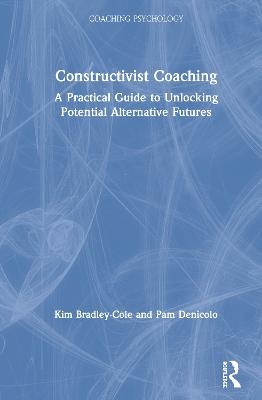
Constructivist Coaching
Routledge (Verlag)
978-1-138-31089-6 (ISBN)
Based on the philosophy of Personal Construct Psychology (PCP), constructivist coaching is interested in how people interpret their own lives and how they ‘construct’ their sense of reality within their social world. Relationships, social context, individual thought processes, identity, and active learning are all fundamental aspects of this approach.
Using a range of methods and practical applications, these expert authors bring constructivist coaching to life for the first time, enabling the reader to quickly grasp both the meaning of the approach and how to apply it. The aim is to work flexibly with your coachees, allowing them to lead the coaching process to unlock what they did not know or realise about themselves and reach greater self-understanding and self-acceptance, and to enable them to engage in meaningful change. With a wide range of examples offered, the methods covered in the book can be used flexibly across contexts, as either a holistic coaching philosophy or an extension to your existing coaching tools.
Constructivist Coaching is an invaluable practical guide for coaches, managers and occupational psychologists, along with anyone else who is involved in supporting the personal development and learning of others.
Kim Bradley-Cole is a Senior Lecturer at University of Winchester, a Chartered and HCPC registered Occupational Psychologist, a qualified psychological test user, and a certified coach. She is a Fellow of the Higher Education Academy, an Associate Fellow of the British Psychological Society and a practicing member of both the Division of Occupational Psychology and the Special Group in Coaching Psychology. Pam Denicolo is a chartered constructivist psychologist and Professor Emeritus from the University of Reading. She was instrumental in establishing an inter-university Social Science Graduate Centre before her retirement from the University of Reading and later contributed to its further development in her consultancy role at the University of Surrey. She continues to work extensively with other universities in the UK, the EU and abroad to develop their doctoral and constructivist research and coaching support.
List of Boxes. List of Figures. About the Authors. Acknowledgements. Chapter 1 Introduction. Chapter 2 Understanding constructivist approaches. Chapter 3 Language, and making the best of conversational approaches. Chapter 4 The potential of PCP as a coaching theory. Chapter 5 Working with emotions and transition cycles. Chapter 6 Being a constructivist coach. Chapter 7 Managing the coaching process. Chapter 8 Working with constructivist techniques: narratives and representational forms. Chapter 9 Working with constructivist techniques: pictorial forms. Chapter 10 Working with constructivist techniques: more structured explorations. Chapter 11 Reflections. Glossary. Appendix A Coaching aids. Appendix B Further resources for constructivist practitioners. Index.
| Erscheinungsdatum | 13.10.2020 |
|---|---|
| Reihe/Serie | Coaching Psychology |
| Zusatzinfo | 21 Line drawings, black and white |
| Verlagsort | London |
| Sprache | englisch |
| Maße | 156 x 234 mm |
| Gewicht | 453 g |
| Themenwelt | Geisteswissenschaften ► Psychologie ► Allgemeine Psychologie |
| Geisteswissenschaften ► Psychologie ► Arbeits- und Organisationspsychologie | |
| Medizin / Pharmazie ► Medizinische Fachgebiete ► Psychiatrie / Psychotherapie | |
| Sozialwissenschaften ► Pädagogik ► Sozialpädagogik | |
| Sozialwissenschaften ► Soziologie | |
| Wirtschaft ► Betriebswirtschaft / Management ► Planung / Organisation | |
| ISBN-10 | 1-138-31089-1 / 1138310891 |
| ISBN-13 | 978-1-138-31089-6 / 9781138310896 |
| Zustand | Neuware |
| Haben Sie eine Frage zum Produkt? |
aus dem Bereich


